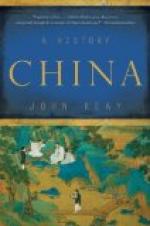Emperor Kao Tsu came from eastern China, and his family seems to have been a peasant family; in any case it did not belong to the old nobility. After his destruction of his strongest rival, the removal of the kings who had made themselves independent in the last years of the Ch’in dynasty was a relatively easy task for the new autocrat, although these struggles occupied the greater part of his reign. A much more difficult question, however, faced him: How was the empire to be governed? Kao Tsu’s old friends and fellow-countrymen, who had helped him into power, had been rewarded by appointment as generals or high officials. Gradually he got rid of those who had been his best comrades, as so many upstart rulers have done before and after him in every country in the world. An emperor does not like to be reminded of a very humble past, and he is liable also to fear the rivalry of men who formerly were his equals. It is evident that little attention was paid to theories of administration; policy was determined mainly by practical considerations. Kao Tsu allowed many laws and regulations to remain in force, including the prohibition of Confucianist writings. On the other hand, he reverted to the allocation of fiefs, though not to old noble families but to his relatives and some of his closest adherents, generally men of inferior social standing. Thus a mixed administration came into being: part of the empire was governed by new feudal princes, and another part split up into provinces and prefectures and placed directly under the central power through its officials.
But whence came the officials? Kao Tsu and his supporters, as farmers from eastern China, looked down upon the trading population to which farmers always regard themselves as superior. The merchants were ignored as potential officials although they had often enough held official appointments under the former dynasty. The second group from which officials had been drawn under the Ch’in was that of the army officers, but their military functions had now, of course, fallen to Kao Tsu’s soldiers. The emperor had little faith, however, in the loyalty of officers, even of his own, and apart from that he would have had first to create a new administrative organization for them. Accordingly he turned to another class which had come into existence, the class later called the gentry, which in practice had the power already in its hands.
The term “gentry” has no direct parallel in Chinese texts; the later terms “shen-shih” and “chin-shen” do not quite cover this concept. The basic unit of the gentry class are families, not individuals. Such families often derive their origin from branches of the Chou nobility. But other gentry families were of different and more recent origin in respect to land ownership. Some late Chou and Ch’in officials of non-noble origin had become wealthy and had acquired land; the same was true for wealthy merchants and finally, some non-noble




